Paper
For submission of articles or Working Papers to CEsA, please send an email to:
comunicacao@cesa.iseg.ulisboa.pt
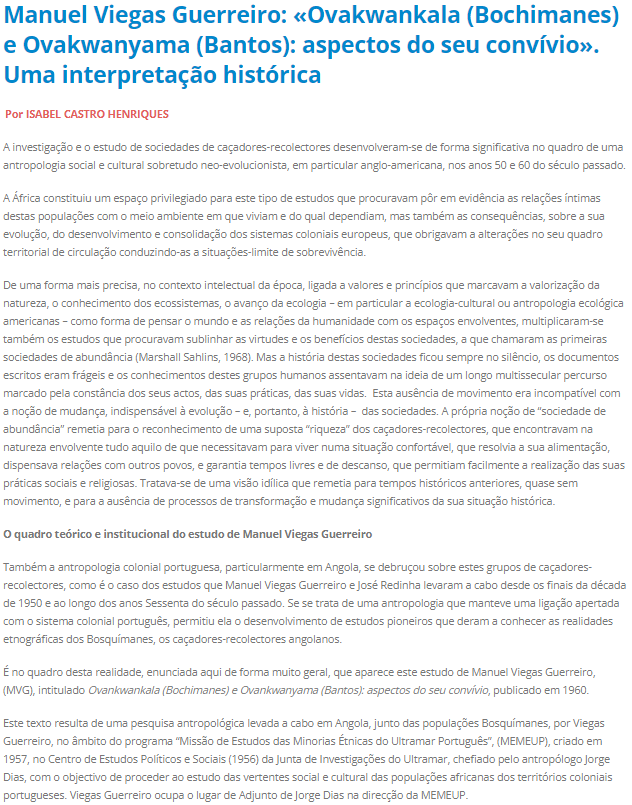
Manuel Viegas Guerreiro: «Ovakwankala (Bochimanes) e Ovakwanyama (Bantos): aspectos do seu convívio». Uma interpretação histórica.
Abstract:
The research and study of hunter-gatherer societies developed significantly within the framework of a mainly neo-evolutionist social and cultural anthropology, particularly Anglo-American, in the 1950s and 1960s. Africa constituted a privileged space for this type of study which sought to highlight the intimate relations of these populations with the environment in which they lived and on which they depended, but also the consequences, on their evolution, of the development and consolidation of the European colonial systems, which forced changes in their territorial framework of circulation, leading them to situations at the limits of survival. In a more precise manner, in the intellectual context of the time, linked to values and principles which marked the valorisation of nature, knowledge of ecosystems, the advance of ecology – in particular American cultural-ecology or ecological anthropology – as a way of thinking about the world and humanity’s relations with the surrounding spaces, there was also a multiplication of studies seeking to underline the virtues and benefits of these societies, which were called the first societies of abundance (Marshall Sahlins, 1968). But the history of these societies always remained silent, the written documents were fragile and knowledge of these human groups was based on the idea of a long, multi-secular path marked by the constancy of their acts, their practices and their lives. This absence of movement was incompatible with the notion of change, which is indispensable to the evolution – and therefore the history – of societies. The very notion of “society of abundance” referred to the recognition of a supposed “wealth” of hunter-gatherers, who found in the surrounding nature everything they needed to live in a comfortable situation, which solved their food needs, dispensed with relations with other peoples, and guaranteed free time and rest, which easily allowed them to carry out their social and religious practices. This was an idyllic vision that referred back to previous historical times, almost without movement, and to the absence of significant transformation and change processes in their historical situation. In Manuel Viegas Guerreiro: «Ovakwankala (Bochimanes) e Ovakwanyama (Bantos): aspectos do seu convívio». Uma interpretação histórica. Isabel Castro Henriques comments on the homonymous study conducted by Manuel Viegas Guerreiro.
Quotation:
“Castro Henriques, I. (2021). «Manuel Viegas Guerreiro – Ovakwankala (Bochimanes) e Ovakwanyama (Bantos): aspectos do seu convívio. Uma interpretação histórica. Lisbon, Newsletter Fundação Manuel Viegas Guerreiro, no 27, julho-setembro 2021, pp. 10-16.”
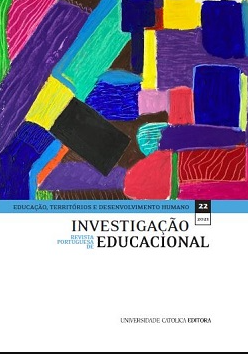
Sources and consequences of teachers’ stress during the Covid-19 pandemic
Abstract:
The covid-19 pandemic has had serious and unprecedented consequences on multiple facets of education. Teachers, students, schools and families have been affected, and the impacts of the pandemic will spill over into the future as well. The aim of Fontes e consequências do stress dos professores durante a pandemia da Covid-19 is to identify and explain the sources and consequences of teachers’ work-related stress and burnout during the pandemic, as well as their job and life satisfaction. Three sources of stress are considered: changes in organisation, content and amount of work; student behaviour and performance; and technostress. The empirical research is based on an original online survey applied to public school teachers (ISCED 2 and 3) in Portugal. Information is collected for four periods: before the pandemic; in the first school closure period in 2020 (16 March-16 September); in the second school closure period in 2021 (15 January-5 April); in the survey period (June-July 2021). The data collected include characteristics and changes about: teachers and their families; job satisfaction, stress and burnout; life satisfaction; working time and teaching duties; work-life balance; teaching goals, methods and outcomes; job stress; conditions for doing remote teaching; expectations for the 2021-22 school year. The results show that teachers’ work stress increased during the pandemic, with student behaviour and performance being a relevant explanatory factor. Difficulties in reconciling work and personal time are also predictors of teachers’ work stress. There are also signs of increasing burnout.
Quotation:
Pato, S., & Fontainha, E. (2021). Fontes e consequências do stress dos professores durante a pandemia da Covid-19. Revista Portuguesa De Investigação Educacional, (22), 1-17. https://doi.org/10.34632/investigacaoeducacional.2021.10467
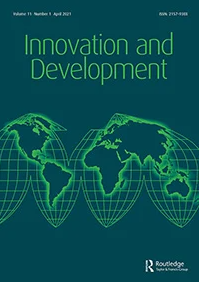
Innovation in development cooperation: emerging trajectories and implications for inclusive sustainable development in the 21st century
Abstract:
In the past twenty years, innovation has slowly, but steadily, become an important presence in development cooperation discourse and practice. The ambitious UN 2030 Sustainable Development Agenda has accelerated this trend, providing a strong framework for the main argument in favour of an innovation agenda for international development: without new ideas and innovative solutions, solving the current global development challenges will not be possible. Although this innovation-push is in line with a wider predominant view of innovation as an inherently positive force of progress, that alone does not explain when, how, and why innovation becomes a key topic in the field. This article seeks to fill this gap in the literature, providing an initial overview of innovation in development cooperation in the post-2000s. It argues, firstly, that innovation has always been part of international development policy and practice. Secondly, it links the recent strengthening of the innovation discourse to three trends in the systemic transformation of the field: the triumph of metrics-based agendas, the ICTs and digitalization revolutions, and the role of private sector actors. It concludes by critically assessing the implications of this narrative in changing the politics of innovation towards more inclusive sustainable development policies and practices.
Quotation:
Ana Luísa Silva (2021) Innovation in development cooperation: emerging trajectories and implications for inclusive sustainable development in the 21st century, Innovation and Development, 11:1, 151-171, DOI: 10.1080/2157930X.2020.1807100

Acerca da Repartição Funcional do Rendimento na Economia Portuguesa
Abstract:
The functional division of income – that is, the question of its primary distribution across the different factors of production and, in particular, between labour income (wages) and capital income (profits, interest and rents) – has been a major theme in political economy since its early days. Acerca da repartição funcional do rendimento na economia Portuguesa empirically analyses the evolution of the wage share in income in Portugal between 1960 and 2017, proposing a grid for interpreting the evolution of the functional distribution in the Portuguese economy characterised by the existence of different periods. Depending on the period in question, the empirical results reveal the existence of strong and significant associations between the evolution of the functional distribution and the real GDP growth rate, the inflation rate and the unemployment rate, respectively. These results suggest the succession over time of different regimes regulating the functional distribution of income in the Portuguese economy, which shift from countercyclical to procyclical over the period under review. The article is organised as follows: after this introduction, section 2 briefly discusses the interest of functional income distribution analysis and its linkages with some other debates in economic theory and analysis; section 3 outlines the evolution of the functional distribution of income in the Portuguese economy in the decades since 1960 and its main trends over time; section 4 carries out a set of bivariate, multivariate and structural stability analyses in order to contribute to a better understanding of the determinants of such evolution; and section 5 concludes.
Quotation:
Abreu, Alexandre; July 2020; 3) “Acerca da repartição funcional do rendimento na economia portuguesa”; Notas Económicas, no. 50; 8) pp. 85-101.
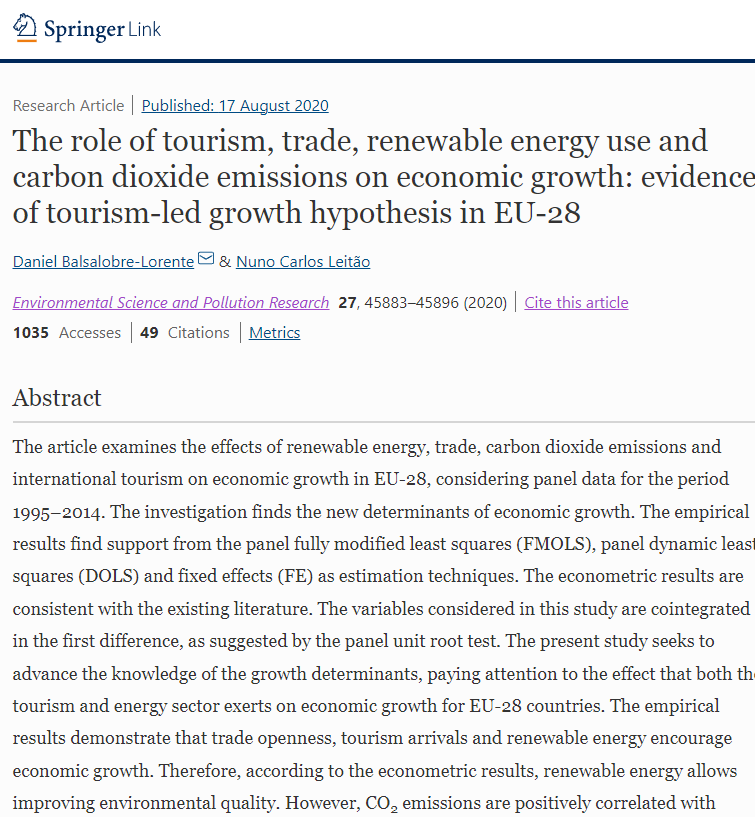
The role of tourism, trade, renewable energy use and carbon dioxide emissions on economic growth: evidence of tourism-led growth hypothesis in EU-28
Abstract:
The Role of Tourism, Trade, Renewable Energy Use and Carbon Dioxide Emissions on Economic Growth: Evidence of Tourism-Led Growth Hypothesis in EU-28 examines the effects of renewable energy, trade, carbon dioxide emissions and international tourism on economic growth in EU-28, considering panel data for the period 1995–2014. The investigation finds the new determinants of economic growth. The empirical results find support from the panel fully modified least squares (FMOLS), panel dynamic least squares (DOLS) and fixed effects (FE) as estimation techniques. The econometric results are consistent with the existing literature. The variables considered in this study are cointegrated in the first difference, as suggested by the panel unit root test. The present study seeks to advance the knowledge of the growth determinants, paying attention to the effect that both the tourism and energy sector exerts on economic growth for EU-28 countries. The empirical results demonstrate that trade openness, tourism arrivals and renewable energy encourage economic growth. Therefore, according to the econometric results, renewable energy allows improving environmental quality. However, CO2 emissions are positively correlated with economic growth, showing that growth is directly correlated by climate change and greenhouse gas. The results also confirm the tourism-led growth hypothesis (TLGH) for the panel. Finally, the empirical results confirm that trade openness, energy use and international tourism contribute to enhance economic growth. Based on these findings, further insights and policy prescription are offered in the concluding section.
Quotation:
“Balsalobre-Lorente, D., Leitão, N.C. (2020): The Role of Tourism, Trade, Renewable Energy Use and Carbon Dioxide Emissions on Economic Growth: Evidence of Tourism-Led Growth Hypothesis in EU-28. Environmental Science and Pollution Research. Publisher: Springer International Publishing”
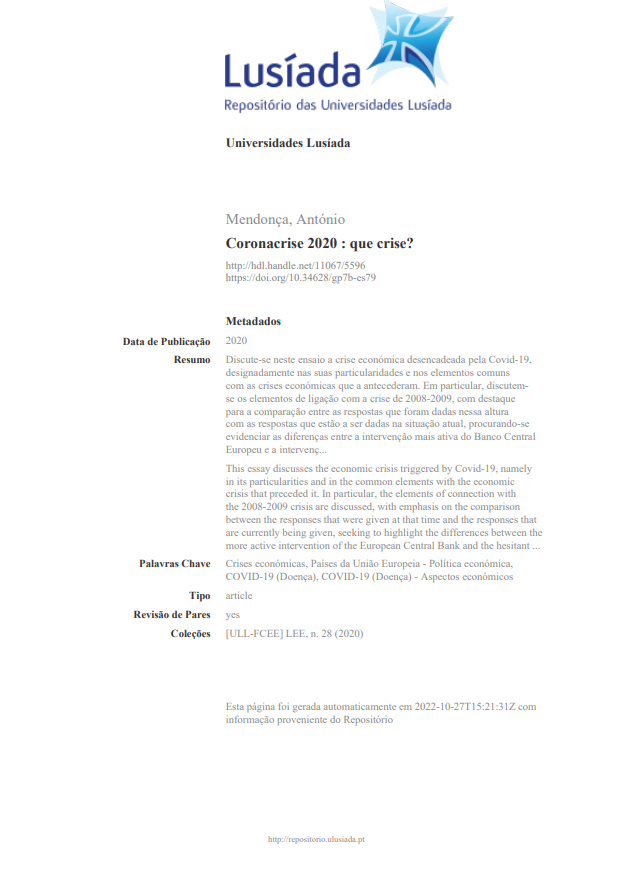
Coronacrise 2020: que crise?
Abstract:
The forecasts already published by national and international institutions on the impact of Covid-19 on economies confirm what had already been anticipated: deep falls in product and employment, fuelled by the joint reduction in consumption, investment and international trade, with consequent effects on deficits and public debt. Coronacrise 2020: que crise? discusses the economic crisis triggered by Covid-19, namely in its particularities and in the common elements with the economic crisis that preceded it. In particular, the elements of connection with the 2008-2009 crisis are discussed, with emphasis on the comparison between the responses that were given at that time and the responses that are currently being given, seeking to highlight the differences between the more active intervention of the European Central Bank and the hesitant and contradictory intervention of national and European institutions with responsibility for fiscal policy. We highlight the need for an economic recovery plan, with a European dimension and integrating national specificities, as well as the need for a change in attitude regarding the role of economic policy, that should favor a long-term expansionist perspective instead of the contractionary perspective which has conditioned European macroeconomic management in recent years.
Quotation:
Mendonça, A. (2020). “Coronacrise 2020: que crise?”. Lusíada. Economia & Empresa, nº 28 (2020), pp. 11-41. https://doi.org/10.34628/gp7b-es79
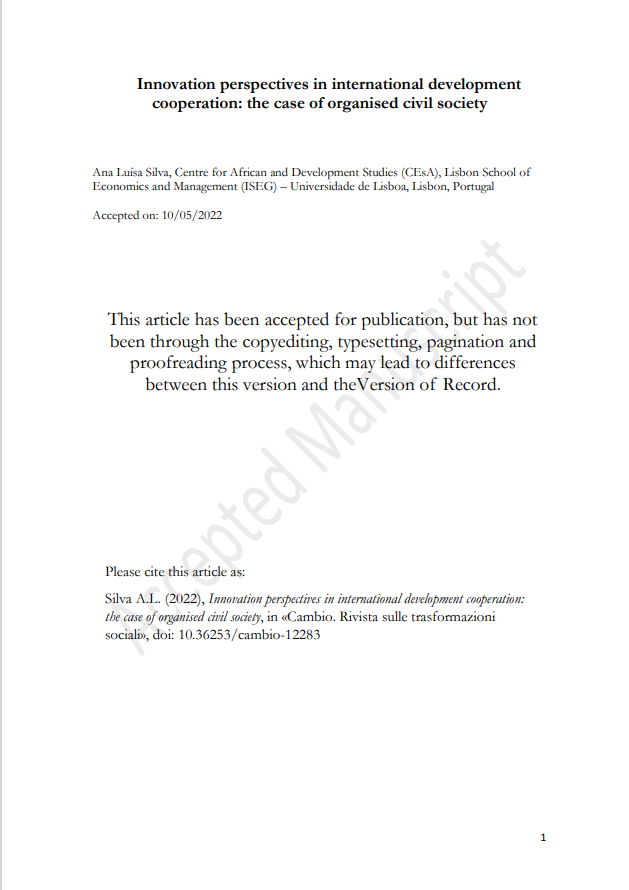
Innovation Perspectives in International Development Cooperation: The case of organised civil society
Abstract:
Non-governmental organisations (NGOs) are still in the side-lines of the emerging literature on innovation in international development cooperation, although the topic has been gaining prominence since the 2000s, accompanying the wider transformation of the development cooperation field. Innovation perspectives in international development cooperation: the case of organised civil society presents the results of a mixed methods research that involved a broad geographic sample of 20 NGO national co-ordinating bodies through an online survey and semi-structured interviews. The goal was to map and analyse innovation perspectives, motivations, and practices in these organisations, understand their relationship with mainstream views of innovation in the field and uncover their potential to promote inclusive innovation. Results suggest that these actors have potential to promote inclusive innovation practices in the field, since they approach innovation with social change as an end goal, as opposed to having an overly solutionist and problem-solving view of social innovation. The paper also highlights the key role of information and communications technologies, as well as digital tools, as both a reason to innovate and enablers of innovation in these organisations. Finally, the conclusion leaves questions open for further research on innovation in development NGOs.
Quotation:
Silva, A. L. (2022). Innovation perspectives in international development cooperation: the case of organised civil society. Cambio. Rivista Sulle Trasformazioni Sociali. https://doi.org/10.36253/cambio-12283
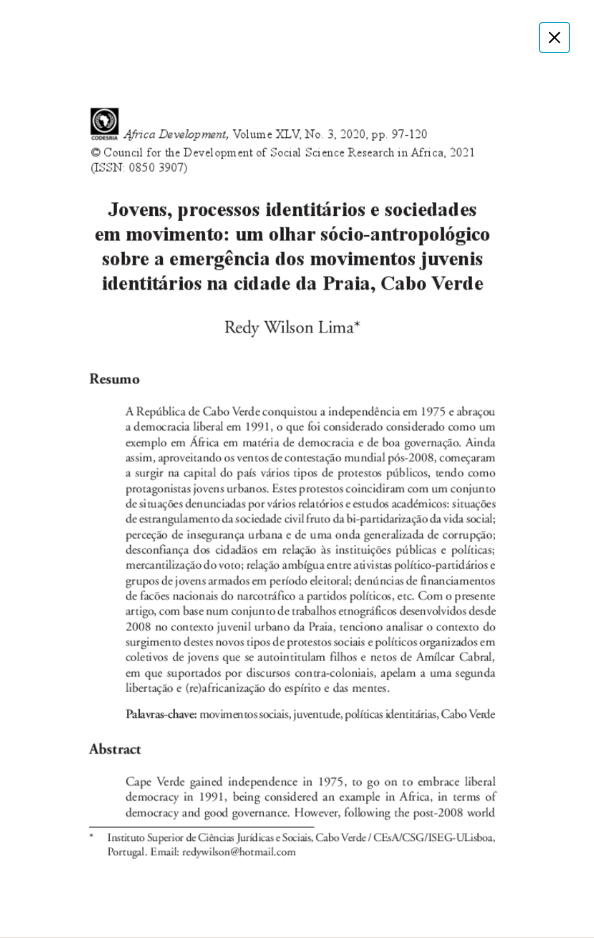
Jovens, processos identitários e sociedades em movimento
Abstract:
The Republic of Cape Verde gained independence in 1975 and embraced liberal democracy in 1991, which was regarded as an example in Africa of democracy and good governance. Still, taking advantage of the post-2008 global winds of protest, various types of public protests began to emerge in the country’s capital, with urban youth as the main protagonists. These protests coincided with a set of situations denounced by various reports and academic studies: situations of strangulation of civil society resulting from the bi-partisanship of social life; perception of urban insecurity and a generalized wave of corruption; citizens’ distrust of public and political institutions; commercialization of the vote; ambiguous relationship between political party activists and armed youth groups during elections; accusations of funding of political parties by national drug trafficking factions, etc. Jovens, processos identitários e sociedades em movimento: um olhar alternativo sobre os movimentos sociais urbanos emergentes na cidade da Praia – Cabo Verde, based on a set of ethnographic works developed since 2008 in the urban youth context of Praia, intends to analyse the context of the emergence of these new types of social and political protests organized in youth groups who call themselves sons and grandsons of Amílcar Cabral, supported by counter-colonial discourses, calling for a second liberation and (re)Africanization of the spirit and minds.
Quotation:
Lima, R.W. (2020). “Jovens, processos identitários e sociedades em movimento: um olhar alternativo sobre os movimentos sociais urbanos emergentes na cidade da Praia – Cabo Verde”. In: Jesus, L.S.B.; Barros, M.; Filice, R.C.G. (Orgs.), Tecendo redes antirracistas II: contracolonização e soberania intelectual. Fortaleza: Imprensa Universitária, p. 116-136.
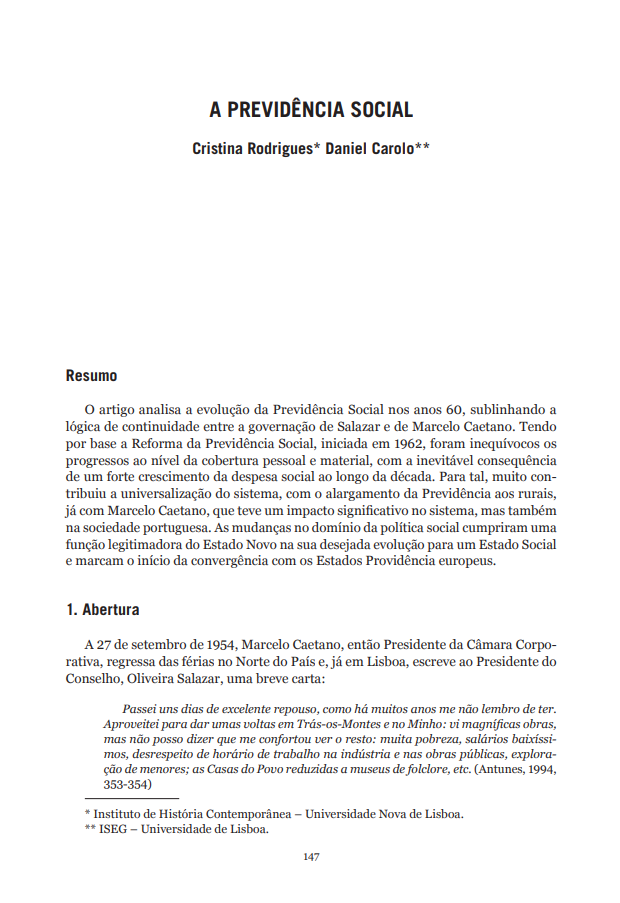
A Previdência Social
Abstract:
The 60’s corresponded to an unequivocal progress in the institutional evolution, material and personal coverage of the Social Welfare system, in which Law 2115, which instituted the 1962 Social Welfare Reform – which was in force as the Basic Law until 1984 – is absolutely central. Statistical data corroborate this statement, and even demonstrate the growth of social spending and the growing role of the State, also as a financer and not with a mere supplementary intervention. A Previdência Social analyses the evolution of Social Welfare in the 60’s, underlining the logic of continuity between Salazar’s and Marcelo Caetano’s government. Based on the Social Welfare Reform, initiated in 1962, progress in terms of personal and material coverage was unequivocal, with the inevitable consequence of a strong growth of social expenditure throughout the decade. To this end, the universalization of the system contributed a lot, with the widening of Welfare to rural areas, already under Marcelo Caetano, which had a significant impact on the system, but also on Portuguese society. The changes in the domain of social policy fulfilled a legitimizing function of the New State in its desired evolution towards a Social State and marked the beginning of convergence with the European Welfare States. We would like to thank Professors João Freire and Álvaro Garrido for reading the initial text of this article and for their relevant contributions to its final version.
Quotation:
“Rodrigues, Cristina & Carolo, Daniel (2020). “A Previdência Social”. In Brito, José Maria Brandão de Brito & Santos, Paula Borges (Coords.) Os Anos Sessenta em Portugal. Duas governações, diferentes políticas públicas. Porto: Afrontamento”
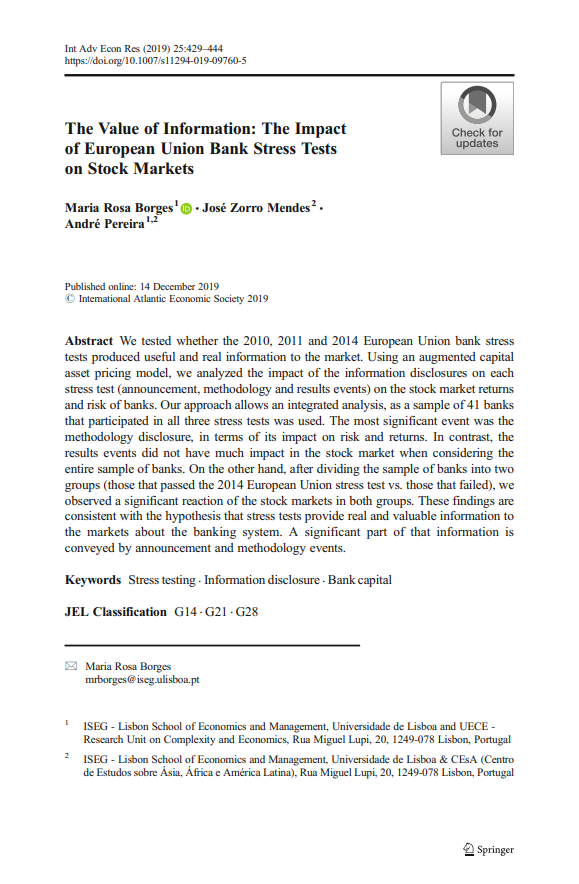
The Value of Information: The Impact of European Union Bank Stress Tests on Stock Markets
Abstract:
In The Value of Information: The Impact of European Union Banks Stress Tests on Stock Markets we tested whether the 2010, 2011 and 2014 European Union bank stress tests produced useful and real information to the market. Using an augmented capital asset pricing model, we analyzed the impact of the information disclosures on each stress test (announcement, methodology and results events) on the stock market returns and risk of banks. Our approach allows an integrated analysis, as a sample of 41 banks that participated in all three stress tests was used. The most significant event was the methodology disclosure, in terms of its impact on risk and returns. In contrast, the results events did not have much impact in the stock market when considering the entire sample of banks. On the other hand, after dividing the sample of banks into two groups (those that passed the 2014 European Union stress test vs. those that failed), we observed a significant reaction of the stock markets in both groups. These findings are consistent with the hypothesis that stress tests provide real and valuable information to the markets about the banking system. A significant part of that information is conveyed by announcement and methodology events
Quotation:
“Borges, M. R., Mendes, J. Z. and Pereira, A. (2019). “The Value of Information: The Impact of European Union Banks Stress Tests on Stock Markets”. International Advances in Economic Research, 25, 429-444. https://doi.org/10.1007/s11294-019-09760-5“





